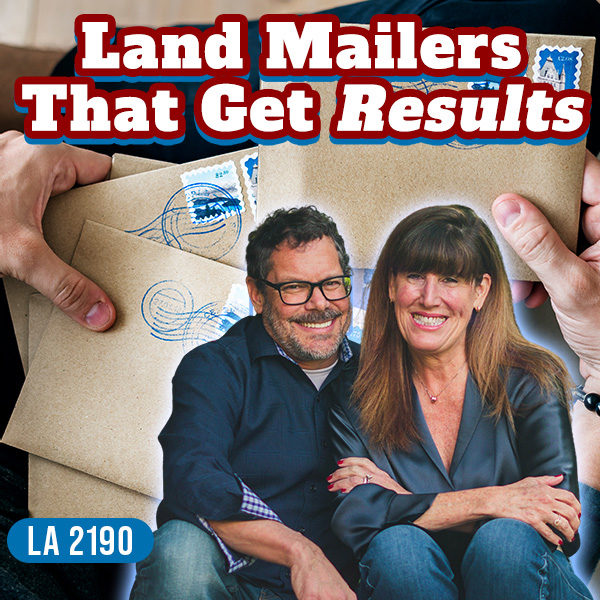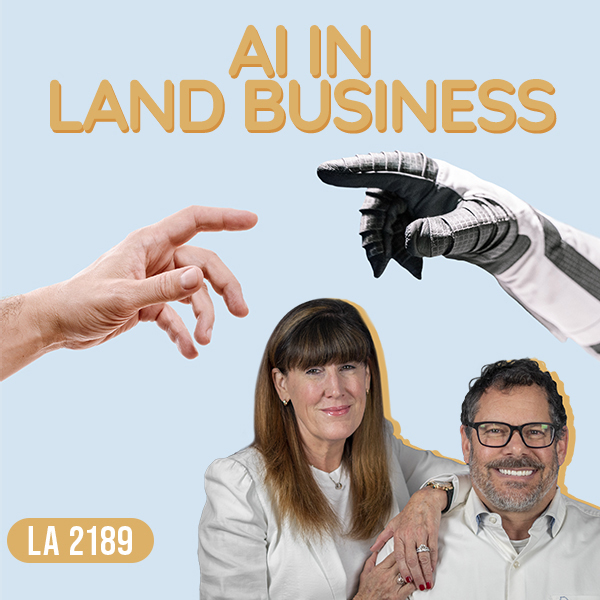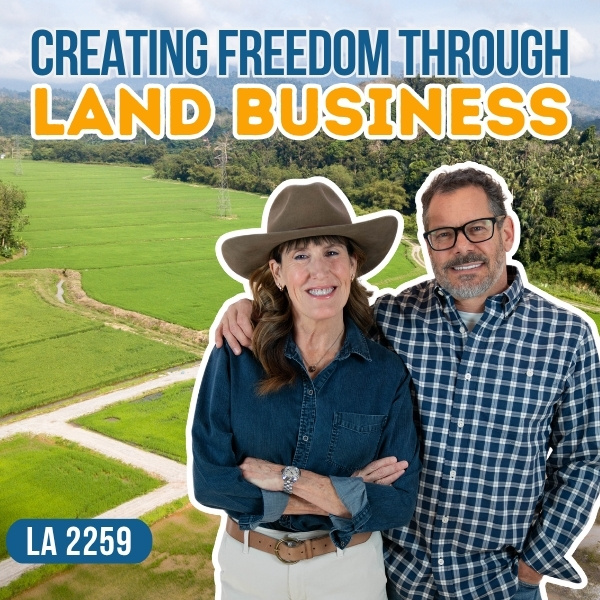Leave Your Land Alone (LA 1385 rerun LA 785)
Leave Your Land Alone (LA 1385 rerun LA 785)
Transcript:
Steven Butala (00:00):
… Jill here.
Jill DeWit (00:00):
Hi.
Steven Butala (00:00):
Sorry, hi, Steve & Jill. Welcome to the Land Academy show, entertaining land investment talk. I’m Steven Jack Butala.
Jill DeWit (00:01):
And I’m Jill DeWit, broadcasting from sunny southern California.
Steven Butala (00:01):
Today, Jill and I talk about leaving your land alone. We’ve been talking about her all week.
Jill DeWit (00:10):
There’s a lot of things I’d like to … just leave it alone. I feel like I say it a lot.
Steven Butala (00:10):
Yeah, why do we as people have to mess with stuff, you know?
Jill DeWit (00:20):
That’s true, and get our hands all up in everything. Leave it alone.
Steven Butala (00:20):
I bet that’s been going on since the beginning of time.
Jill DeWit (00:28):
I’m sure it has.
Steven Butala (00:28):
I more than anybody love the concept of messing with stuff to improve it, or constantly moving forward, or you know-
Jill DeWit (00:33):
It’s true.
Steven Butala (00:33):
For me it’s all data driving. Finding better ways to analyze data to make decisions and stuff.
Jill DeWit (00:43):
That’s true.
Steven Butala (00:43):
But actually physically changing a property, like a contractor does or a developer does, and I understand all that, too. The world needs people like that, for sure.
Jill DeWit (00:49):
There’s a ton-
Steven Butala (00:49):
I’m just not one of those people and I think if you’re gonna maximize money, you know, for us at this level, there’s no better way for us to maximize money than what we do.
Jill DeWit (01:01):
I agree.
Steven Butala (01:01):
You know-
Jill DeWit (01:01):
I was gonna say, the whole point to me about leaving it alone is you already won, so why mess with it? You bought it at the right price, that’s when you know. You should buy these assets knowing that if I do nothing, it’s just gonna be fine.
Steven Butala (01:13):
We’re all in the business of creating equity, right? You know what, before we get into it, lets take a question from one of the members in the Land Ambassadors online community, it’s free.
Jill DeWit (01:32):
Brandon asks, “In our last mailer campaign, I suppose some properties zoned for multi-family were included and someone just signed an offer and sent it back-”
Steven Butala (01:43):
Good.
Jill DeWit (01:43):
“… to buy their multi-family zoned vacant land in a city for 8 grand.”
Steven Butala (01:43):
That’s what we’re in the business here for.
Jill DeWit (01:43):
What?
Steven Butala (01:56):
I love how this is going.
Jill DeWit (01:56):
“The property across the street, also vacant, is asking $50,000. The market in this area is fairly hot and we’ve sold property in this subdivision before, but not multi-family.”
Steven Butala (02:01):
This is good stuff.
Jill DeWit (02:01):
“However, the town is currently embroiled in a lawsuit against the city or department of water resources over the prohibition of drilling new wells. I’m quite certain, though, based on city planning maps, that this property has access to public water lines. I’ve called the water company several times in the past, but they’re never helpful with vacant land.” No kidding.
(02:14):
“They won’t tell me if they service a particular area. Only if they service an address that already has a house on it. So my question is, is this a run to the bank situation?”
Steven Butala (02:38):
Yes.
Jill DeWit (02:38):
“Or are there troubles buying multi-family zoned vacant land? Oh, and I almost forgot to mention that across the street and two parcels over, there’s already a thriving apartment complex constructed. Also, SFR land in the area is asking $18,000 to $20,000 and up. So what would you guys do?”
Steven Butala (02:48):
I would run to the bank.
Jill DeWit (02:48):
Totally.
Steven Butala (02:48):
You know, I don’t know what to say. I understand and respect your quest for, like I said, getting to know the facts and the information, but I wouldn’t have taken it this far. I would have ran to the bank and purchased the property.
Jill DeWit (03:14):
Well, I like, you know, what we say is put in the posting in good faith what you already know. So in good faith you could say, “Here’s what I know about every parcel around there. I can’t get a definitive answer about this. So you just need to know, it looks good but I can’t guarantee it.”
Steven Butala (03:30):
Yeah.
Jill DeWit (03:30):
That’s really the kind of, that’s what you’re saying. “And I can’t definitively say you can’t do it.” It’s awesome. It’s a great situation.
Steven Butala (03:47):
Water. Water’s always a huge topic, especially out west. And chances are this is out west or there wouldn’t be any issues. Water and new hookups, all of that stuff. I’m not educated enough to know about it, but I’ll tell you, I do know talking to municipalities about things like this can be really frustrating and I think that if you stuck to our actual Land Academy 1.0 / Cash Flow From Land concept and you buy for $8 and sell it for $16 and double your money, I think that’s gonna happen in a week. And just with disclosing 100% of the truth, which is, “I called the water company and I don’t know, they couldn’t get any answers. And everything else, I don’t know anything about it.” But this is a hell of a deal.
Jill DeWit (03:57):
Right. Love it.
Steven Butala (03:57):
Today’s topic: leave your land alone. Don’t call about the water rights. This is the meat of the show.
Jill DeWit (04:44):
That’s hilarious.
Steven Butala (04:44):
Half kidding there.
Jill DeWit (04:44):
Don’t pick up the phone and do it. Hold back. Leave it alone. Leave it alone. Don’t even look. Don’t look at it, just leave your land alone. Don’t look at it. Don’t make a single call. Don’t research exactly what … more about the zoning to see what else is possible and if you can really keep an [inaudible 00:05:18] on there 365 days a year, because I’ve had this, or you have to move it every other month. Something silly like that. Leave it alone. Now we’re done.
Steven Butala (04:56):
We are all here, all of us, unless there’s something really strange about you, we’re all here to create equity. How do you create equity? This is philosophical financial stuff now. You create equity by a, buying something for less than it’s worth. If you buy, I’m gonna use the caller. I keep saying caller. The question asker, I’m gonna use their example. They’re buying a piece of property for $8,000. It’s worth $50 and they’re gonna sell it for $16. They have created $8,000 worth of equity, just by signing a piece of paper and then signing a piece of paper again on the sell side. Or several pieces of paper. You know what I mean.
Jill DeWit (05:30):
Yes.
Steven Butala (05:30):
There’s another way to create equity by making improvements or creating something. Here’s an obscure example. This is actually, these are true examples. Did you know that a television in general is basically worth the sum of its parts? The sum of its raw material parts. There’s very, very, very little markup or equity created when you construct a television. I don’t know why, that’s just the way it is.
(06:19):
When you construct a car, the kind that everybody drives, not like a high end car. You create about, the manufacturer takes raw materials and they create about, through the whole process, $10,000 worth of equity. You can either create equity by improving the raw material, improving the land, putting a structure on it, sub-dividing it, doing some stuff to it.
Jill DeWit (06:43):
Right.
Steven Butala (06:43):
Or you can just buy it cheap. Those are the two ways. There’s not any more ways than that creating equity. Which one do you want? Which one’s easier? Which one’s less time consuming? Which one’s more data driven?
Jill DeWit (07:07):
Which one doesn’t need a factory and all that?
Steven Butala (07:07):
For us, and most of our members if not all of them, we all believe in using data to get, and manipulating data, to find sellers who don’t want this stuff anyway.
Jill DeWit (07:17):
Right.
Steven Butala (07:17):
We’re not selling them any, we’re not selling them, trying to make them make a decision they don’t want to make. There’s no hard selling in this at all. Sell the property for this, this is what we’re willing to pay, sign here. Otherwise, we’re all good.
Jill DeWit (07:33):
That’s right. Move on. No big deal.
Steven Butala (07:33):
And there’s very consistent, predictable results. I’ve been doing this for years and years and millions and millions of offers we’ve sent. And we continue to send offers every single week. And the numbers do not fluctuate that much. Which one do you wanna do? Do you wanna leave your land alone or do you wanna go through the process of creating equity the other way?
Jill DeWit (07:45):
Right.
Steven Butala (07:45):
You have two choices. If you have a job, all you’re doing is doing this for someone else right now. No matter how small your job is or how high up you are, you’re helping somebody else create equity and they’re paying you for it in the form of a salary.
Jill DeWit (08:10):
That’s true.
Steven Butala (08:10):
So I woke up to this a lot of years ago and said, “You know, I’m just not interested-”
Jill DeWit (08:29):
I haven’t looked at it that way.
Steven Butala (08:29):
“… in creating equity for someone else any longer.”
Jill DeWit (08:29):
That’s very true.
Steven Butala (08:29):
I’d like to create it for myself.
Jill DeWit (08:29):
Well, even if you’re in the service industry, whatever you do, maybe you’re … I don’t know, maybe you’re an accountant. You’re doing the paperwork and you’re good at it. You’re better than everybody, you’re better than me learning it myself to do my own books, for example, and I’m willing to pay for that. So that’s the equity, right? And I’m talking like you work for somebody in an accounting firm. The firm is making money having all these people do all the work and marking it up-
Steven Butala (08:36):
Sure.
Jill DeWit (08:36):
… obviously, and that’s the equity.
Steven Butala (08:36):
Yeah.
Jill DeWit (08:36):
Is that a good example? You looked at me like I’m-
Steven Butala (08:36):
Yeah, I mean I would argue the service company, accounting is a service company for … let’s say the accounting company, their clients are manufacturers. They design airplane parts, you know, they’re just now … they’re employed by an airplane manufacturer, part manufacturer, to create equity for the … they’re just getting paid to help that person create equity.
Jill DeWit (09:08):
Right. Exactly.
Steven Butala (09:08):
It’s a little bit of a second tier relationship, but yeah, you’re right.
Jill DeWit (09:33):
Okay.
Steven Butala (09:33):
Like a restaurant, a pizza restaurant. You talked about it yesterday.
Jill DeWit (09:33):
Yes.
Steven Butala (09:33):
This, you know, what are the ingredients in a pizza? It’s gotta be maybe a dollar, right? Maybe two dollars, and you’re selling it for $14 or $25, whatever.
Jill DeWit (09:41):
Right.
Steven Butala (09:41):
I mean, you’re creating equity that way. You’re improving those raw ingredients to make a final product. I know this is philosophical.
Jill DeWit (09:50):
Right.
Steven Butala (09:50):
But it’s important to understand, because I think a tremendous amount of time and resources and I’m gonna get green here for a second. All the problems that happen with labor and carbon footprints and landfills and inefficiency, all come from the second part. The second part of creating equity. Is this boring yet?
Jill DeWit (09:56):
No, I’m hanging in there. I wonder, you know what’s so funny?
Steven Butala (10:25):
How bad is it really?
Jill DeWit (10:25):
Well, it’s funny. I’m sure, this is what’s great. This is the value of what we’re doing right now with the audio and the video, so people listening know that, “Guy, Jill’s kind of quiet there.” And people watching it are going, “Where is her mind going right now?” Can you all tell that like my eyes are glossing over, I’m staring at the camera and I have this smile on my face like I’m paying attention, but if you look real deep into my eyes-
Steven Butala (10:45):
There’s nothing there.
Jill DeWit (10:45):
There’s nothing.
Steven Butala (10:45):
You’re thinking about the beach, aren’t you now?
Jill DeWit (10:45):
I’m thinking about pizza for lunch.
Steven Butala (11:14):
Wow, that sounds good doesn’t it?
Jill DeWit (11:14):
Yeah. That’s kind of where I went, and so then we … back to your pizza example.
Steven Butala (11:22):
Oh, man.
Jill DeWit (11:22):
Oh gosh, sorry.
Steven Butala (11:22):
So, and you know, the world is packed full of people that have to see what they’re creating and touch it and make the pizza. They just see what’s in front of them and they make stuff. And I understand that. Go ahead.
Jill DeWit (11:30):
I have a good point. This is so interesting. I was watching a documentary, or something I was reading on, I don’t remember what. Maybe it was … I’m always reading and looking at new stuff on growing your business and things like that, and I was just, this whole discussion about people who can’t grow their business. And it made me think of the pizza story. It was talking about a woman who had a bakery. She was so excited, she opened this bakery, but she couldn’t shift from being the sole baker and touching it all and making it all go out perfect from her shop to grow her business and even imagine having two stores and three stores and four stores, which she could.
Steven Butala (11:44):
Totally different talents.
Jill DeWit (11:44):
But she couldn’t, she had to touch it.
Steven Butala (11:44):
Yeah.
Jill DeWit (11:44):
She couldn’t make that transition.
Steven Butala (11:44):
That’s a bakery, by the way, that you wanna go to.
Jill DeWit (12:22):
Oh, yeah, because it’s awesome.
Steven Butala (12:22):
You don’t wanna own it or any of that stuff.
Jill DeWit (12:22):
Well, hold on a moment though. Here’s my other thing-
Steven Butala (12:22):
As a customer.
Jill DeWit (12:29):
Three, I don’t know, by three years in it’s not gonna be as good as it was on day one, because the woman’s burnt out now. If she’s the one opening up the bakery every morning at 4:00 AM, you can’t do that. You will work yourself to the whatever. I just, made me think of that.
Steven Butala (12:34):
Yeah.
Jill DeWit (12:34):
That’s … sorry.
Steven Butala (12:34):
No, it’s okay. For my money, the other element here is time, right? Let’s say-
Jill DeWit (12:52):
That’s good.
Steven Butala (12:52):
You have two choices with a piece of property. You can sell it. Immediately re-sell it for less or you can sit around and create equity by improving it for way more time and way more money, so which one do you wanna do?
Jill DeWit (13:02):
Exactly.
Steven Butala (13:02):
And what’s also involved in that decision is risk. What are you gonna run into? What are the unknown issues that you’re gonna run into by-
Jill DeWit (13:16):
Good point.
Steven Butala (13:16):
… connecting to the city water? Tons. In this day and age, you don’t just … in this country, you can’t just do stuff without, you gotta approval from everybody.
Jill DeWit (13:23):
Right.
Steven Butala (13:23):
Everybody wants to be paid, and it never goes how you think it’s gonna go.
Jill DeWit (13:23):
Right.
Steven Butala (13:23):
You know how, reselling land, if you listen to more than 20 minutes of any episode of these shows, you know how much of a curmudgeon I am, and a naysayer I am about all of, just stuff that goes on. There’s constantly stuff that gets in your way of creating equity. But if you buy an asset and just immediately resell it, it almost goes … I have to say, we’ve done what, almost 16,000 deals right now up to this point.
Jill DeWit (13:34):
That’s us, that’s not our community.
Steven Butala (13:34):
And we buy … oh, our community.
Jill DeWit (13:34):
I don’t even wanna know, but I’m just saying, I wanna make sure it’s clear it’s-
Steven Butala (14:03):
They do that many in a month.
Jill DeWit (14:03):
Exactly.
Steven Butala (14:03):
And I have to say, we have had, I can probably count on two hands the problems that we’ve actually had in any of those deals.
Jill DeWit (14:08):
Because we kept it simple.
Steven Butala (14:08):
Yeah.
Jill DeWit (14:08):
Keep it simple, stupid.
Steven Butala (14:08):
Just leave it alone. Leave your land alone.
Jill DeWit (14:08):
Can you imagine? I have a question. Can I ask a question?
Steven Butala (14:18):
Leave your land alone. Yeah.
Jill DeWit (14:18):
How fast would we have been out of business if we decided on every piece of rural vacant land that we purchase that we would put in a road and a well and get power out there? Could you-
Steven Butala (14:26):
We would be out of business on the first deal.
Jill DeWit (14:26):
Thank you, that’s my point. I’m done.
Steven Butala (14:43):
I mean, I don’t know how else to follow that up.
Jill DeWit (14:43):
Could you imagine?
Steven Butala (14:43):
I mean, that’s in the simplest terms, that’s it. Just leave it alone.
Jill DeWit (14:50):
Exactly. It’s for the end user to do what they want with.
Steven Butala (14:56):
That’s their job.
Jill DeWit (14:56):
Exactly.
Steven Butala (14:56):
You know, also, could you imagine if where live, none of that was there?
Jill DeWit (15:02):
Right.
Steven Butala (15:02):
You would never wanna live there.
Jill DeWit (15:02):
Exactly.
Steven Butala (15:02):
Buying stuff and reselling it, or buying a company. That’s for another topic. Buying a company that buys stuff and reselling it as the owner, where you don’t work there, I’m actually writing a book called Acquisitions. There’s no way to make money faster than buying a company and never working there, but improving the backend stuff. The data piece, the computers. Not the actual whatever they do, make pizzas or make airplane parts or whatever, everything in between. That’s off topic for a whole different time.
Jill DeWit (15:07):
I understand.
Steven Butala (15:07):
Creating equity. You wanna find the most efficient way to create equity, and I’ll end it like that.
Jill DeWit (15:45):
Leave your land alone.
Steven Butala (15:45):
Well, you’ve done it again. You spent another 15 or 20 minutes listening to and watching the Land Academy show. Join us next time for other interesting episodes and we’ll answer all your questions. In the mean time, if you post them on landinvestors.com, it’s free. You are not alone in your real estate ambition.
(15:52):
It’s too much philosophy.
Jill DeWit (15:52):
Yeah, that was good, though.
Steven Butala (15:52):
Was it?
Jill DeWit (15:52):
No, I think that was good. I think you made your point. I mean, we hope we made our point. I’m sure we made our point.
Steven Butala (16:19):
Yeah, I’m sure of it, too.
Jill DeWit (16:19):
I think by now you know what we’re all about. Share the fun by subscribing at iTunes or wherever you are listening or watching on YouTube and while you’re at it, please rate us there. We are Steve & Jill.
Steven Butala (16:28):
Information-
Jill DeWit (16:28):
… and inspiration-
Steven Butala (16:28):
… to buy undervalued property.
—————————————-
If you have any questions or comments, please feel free to email me directly at steven@BuWit.com.
The BuWit Family of Companies include:
I would like to think it’s entertaining and informative and in the end profitable.
And finally, don’t forget to subscribe to the show on Apple Podcasts.















